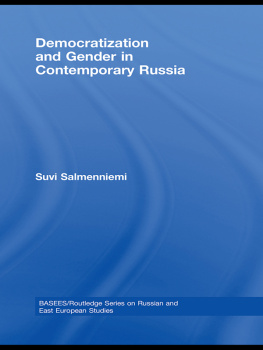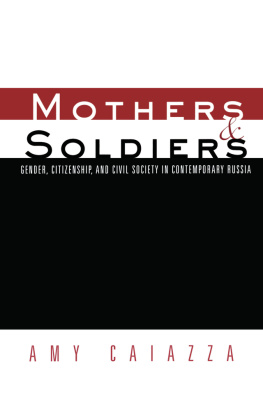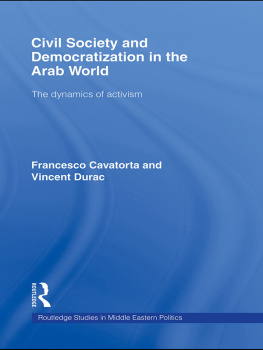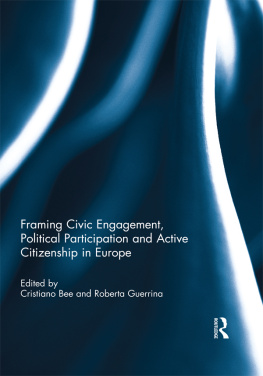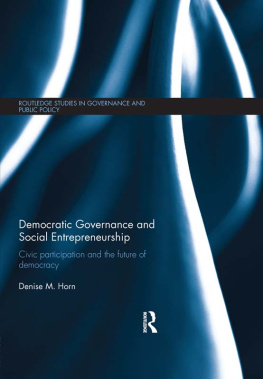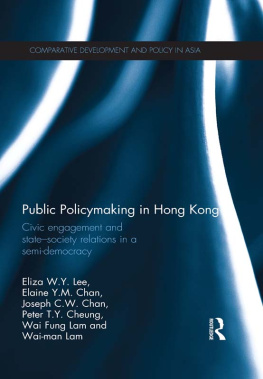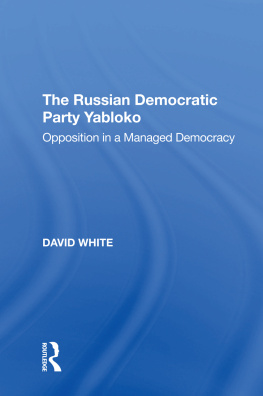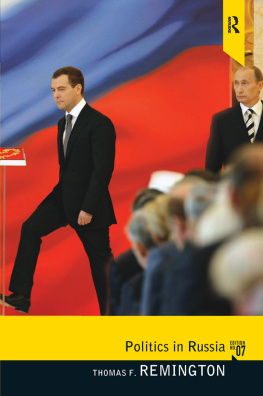Dr Salmenniem has produced a compelling, multi-faceted portrait of civic activism in provincial Russia, and an original account of the gender dimensions of civic participation. It should be read by all those interested in the development of civil society in Russia.
Sarah Ashwin, London School of Economics and Political Science
Suvi Salmenniemi spent 7 months in the city of Tver where she carried out field research and interviewed leaders and activists of civic groups. As a result she wrote this highly qualified scholarly work based on anthropological study of a segment of the Russian civil society.
This book is a major achievement in two research fields: the study of the Russian civil society and the study of the Russian gender order. In both cases we see tensions between new and old discourses, an overlapping of traditional and novel repertoires and focuses on localized and personalized democratic innovations.
Salmenniemi compares two different civic institutionsthe old Trade Union of Health Care Workers with its Soviet legacy and the new, post-Soviet Gender Studies Centre. She shows convincingly how differentiated the field of civil society is and how it is structured by the national and local political opportunities providing barriers and openings for civic activism and its interpretations.
This superb study reveals gendered dimension of civic activism, explaining how traditional gender ideologies can justify public participation of Russian women. Womens voices from the interviews reveal that certain types of civic activism is interpreted as part of womens caring.
The research also proves that personalized networks has been the starting point of civic organizations in Russia that later get institutionalized.
Elena Zdravomyslova, European University at St. Petersburg
Democratization and Gender in Contemporary Russia
This book examines civic activism, democratization and gender in contemporary Russia. It describes the character and central organizing principles of Russian civic life, considering how it has developed since the Soviet period, and analysing the goals and identities of important civic groupsincluding trade unionsand the meanings they have acquired in the context of wider Russian society. In particular, it investigates the gender dimensions of socio-political participation in Russia, considering what kinds of gendered meanings are given to civic organizations and formal politics, and how femininity and masculinity are represented in this context. It explores the role of state institutions in the development of democratic civic life, showing how, under the increasingly authoritarian Putin regime and its policy of managed democracy, independent civic activism is both thriving yet at the same constrained. Based on extensive fieldwork research, it provides much needed information on how Russians themselves view these developments, from the perspective both of civic activists and of the local authorities.
Suvi Salmenniemi is a postdoctoral researcher at the Department of Sociology, University of Helsinki, specializing in gender, cultural and Russian studies. She is currently engaged in a comparative research project that studies self-help and conceptions of a good life in Finland and Russia.
BASEES/Routledge Series on Russian and East European Studies
Series Editor: Richard Sakwa
Department of Politics and International Relations, University of Kent
Editorial Committee:
Julian Cooper, Centre for Russian and East European Studies, University of Birmingham
Terry Cox, Department of Central and East European Studies, University of Glasgow
Rosalind Marsh, Department of European Studies and Modern Languages, University of Bath
David Moon, Department of History, University of Durham
Hilary Pilkington, Department of Sociology, University of Warwick
Stephen White, Department of Politics, University of Glasgow
Founding Editorial Committee Member:
George Blazyca, Centre for Contemporary European Studies, University of Paisley This series is published on behalf of BASEES (the British Association for Slavonic and East European Studies).
The series comprises original, high-quality, research-level work by both new and established scholars on all aspects of Russian, Soviet, post-Soviet and East European Studies in humanities and social science subjects.
- 1 Ukraines Foreign and Security Policy, 19912000
- Roman Wolczuk
- 2 Political Parties in the Russian Regions
- Derek S. Hutcheson
- 3 Local Communities and Post-Communist Transformation
- Edited by Simon Smith
- 4 Repression and Resistance in Communist Europe
- J. C. Sharman
- 5 Political Elites and the New Russia
- Anton Steen
- 6 Dostoevsky and the Idea of Russianness
- Sarah Hudspith
- 7. Performing RussiaFolk Revival and Russian Identity
- Laura J. Olson
- 8 Russian Transformations
- Edited by Leo McCann
- 9 Soviet Music and Society under Lenin and Stalin
- The Baton and Sickle
- Edited by Neil Edmunds
- 10 State Building in Ukraine
- The Ukranian parliament, 19902003
- Sarah Whitmore
- 11 Defending Human Rights in Russia
- Sergei Kovalyov, dissident and human rights commissioner, 19692003
- Emma Gilligan
- 12 Small-Town Russia
- Postcommunist livelihoods and identities a portrait of the Intelligentsia in Achit, Bednodemyanovsk and Zubtsov, 19992000
- Anne White
- 13 Russian Society and the Orthodox Church
- Religion in Russia after communism
- Zoe Knox
- 14 Russian Literary Culture in the Camera Age
- The word as image
- Stephen Hutchings
- 15 Between Stalin and Hitler
- Class War and Race War on the Dvina, 194046
- Geoffrey Swain
- 16 Literature in Post-Communist Russia and Eastern Europe
- The Russian, Czech and Slovak fiction of the changes 198898
- Rajendra A. Chitnis
- 17 Soviet Dissent and Russias Transition to Democracy
- Dissident legacies
- Robert Horvath
- 18 Russian and Soviet Film Adaptations of Literature, 19002001
- Screening the word
- Edited by Stephen Hutchings and Anat Vernitski
- 19 Russia as a Great Power
- Dimensions of security under Putin
- Edited by Jakob Hedenskog, Vilhelm Konnander, Bertil Nygren, Ingmar Oldberg and Christer Pursiainen
- 20 Katyn and the Soviet Massacre of 1940
- Truth, justice and memory
- George Sanford
- 21 Conscience, Dissent and Reform in Soviet Russia
- Philip Boobbyer
- 22 The Limits of Russian Democratisation
- Emergency powers and states of emergency
- Alexander N. Domrin
- 23 The Dilemmas of Destalinisation
- A social and cultural history of reform in the Khrushchev Era
- Edited by Polly Jones
- 24 News Media and Power in Russia
- Olessia Koltsova
- 25 Post-Soviet Civil Society
- Democratization in Russia and the Baltic States
- Anders Uhlin
- 26 The Collapse of Communist Power in Poland
- Jacqueline Hayden
- 27 Television, Democracy and Elections in Russia
- Sarah Oates
- 28 Russian Constitutionalism
- Historical and contemporary development
- Audrey N. Medushevsky
- 29 Late Stalinist Russia
- Society between reconstruction and reinvention

